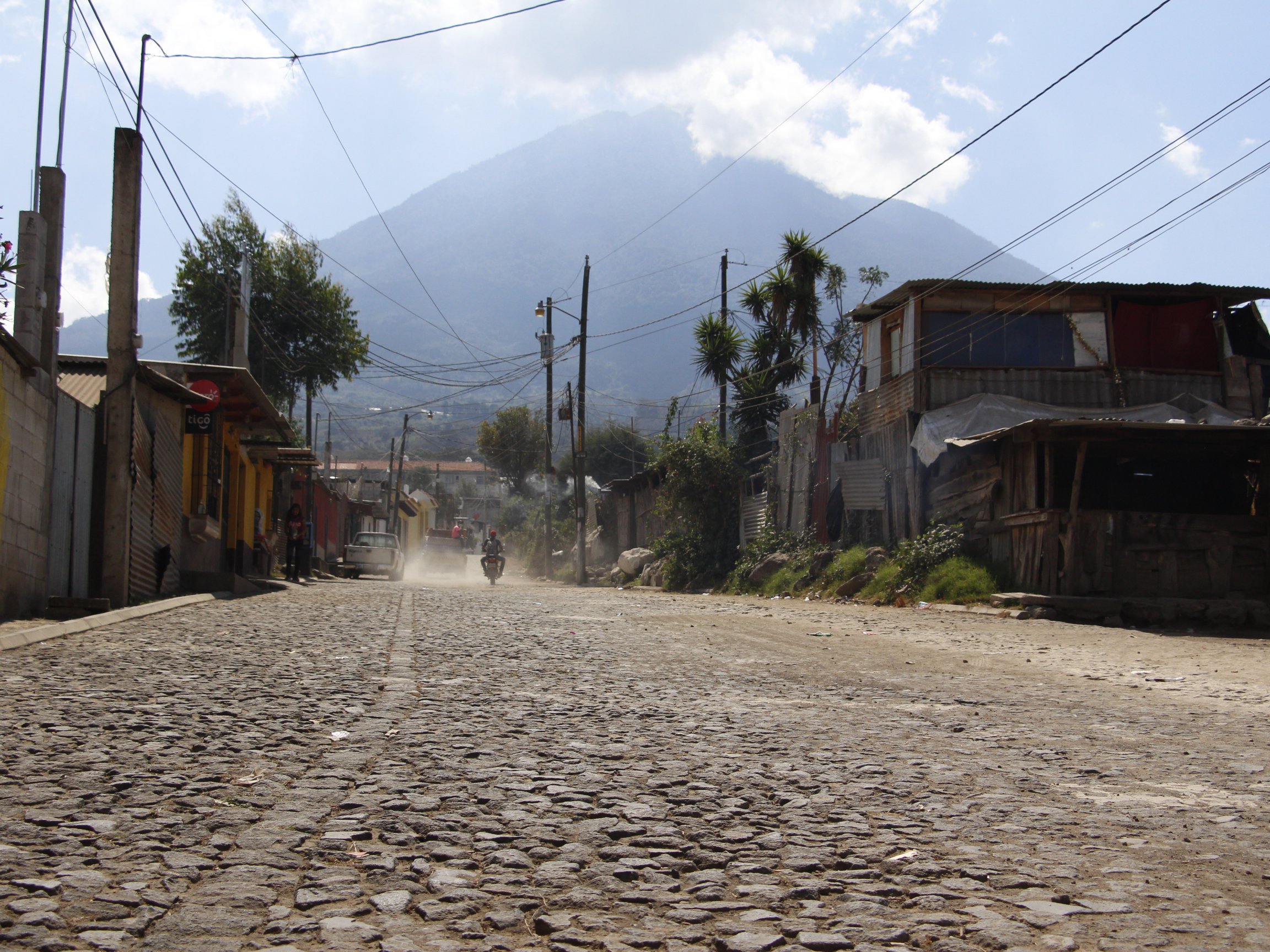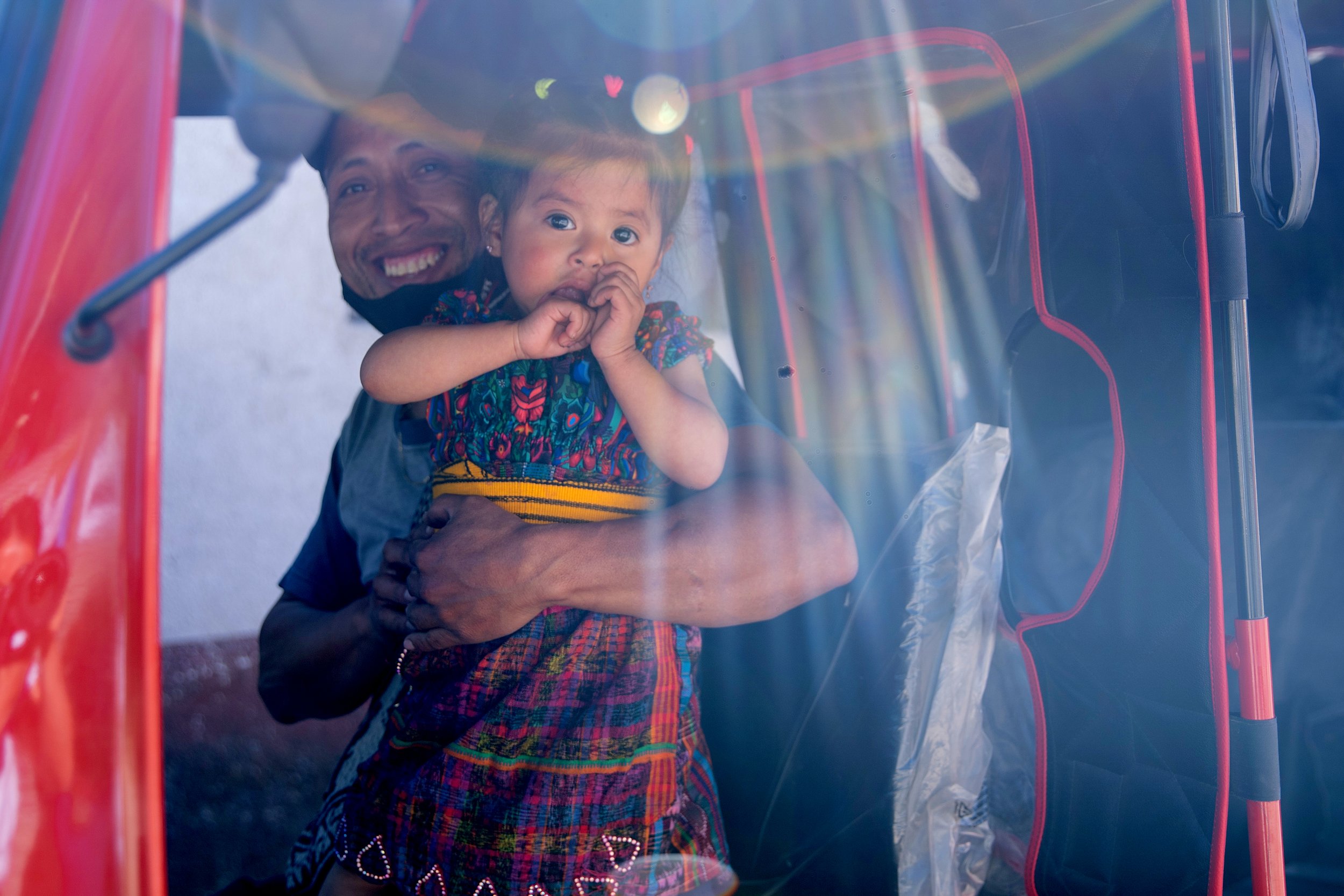
In January 2022, students from Guatemala City’s Francisco Marroquín University and students from Bethel University in St. Paul, Minnesota met in Antigua, Guatemala. Friendships were made, stories were told and challenges were embraced.
Here are our stories….

A Break in routine
By Majo Díaz
Every day had started to feel like the same routine. I saw the same people, listened to the same music – even the perfect Guatemalan weather had started to feel stale. How was I supposed to give all these things meaning if they weren’t new? I wanted a new tune.
The answer was hidden in a little house down a dusty hill in Tecpán. The first time we arrived, the Tians prepared for our visit. They cleaned their house, set up some chairs and dressed in their nicest clothes. They were all wearing masks and keeping a safe distance because they didn’t know where we had been. They answered our questions politely but hesitantly because we still came from the unknown.
As days went by, more members of the family approached us. They would eat and drink with us, let us see their bedrooms and their photos. Soon it felt like we were a part of the family.
To understand more about the Tians’ life without wasting their time, we visited them at night, while the men were still working and the women of the house were getting ready for dinner. Juliana, the mother of the household, prepared black corn tortillas on the top of a cinder block oven powered by burning wood. Along with two other reporters and an instructor, I crammed into the small backyard kitchen made of sheet metal. One table, a dirt floor and the smoke from the oven filled the space.
Juliana formed small balls of corn dough and invited us to eat tortillas off the flat metal atop the fire. After trying one and deciding they were the most delicious tortillas in all of Guatemala, we asked Juliana if she would let us cook at least one tortilla with her. After she agreed, we rolled up our sleeves, wet our hands with hot water and dug our hands into the basket of corn dough. Juliana was an excellent teacher. She told us that the secret ingredient of a good tortilla was to find the perfect balance between patience and agility.
As we cooked tortillas, Ramiro, Juliana’s husband, entered the kitchen and saw us – a Guatemala City college student with three Americans – cooking and smiling with his wife. We were side by side, sometimes arm in arm, laughing. eating and sharing memories as we cooked the week’s supply of tortillas.
The warmth in this room was unique, mainly because all the other rooms were ice cold, but also because the six human beings vibrated to the same tune. At that moment, I realized Guatemala, my Guatemala, is all about family, love and happiness. Even though it was a cold January night outside, this family warmth was all I sought.
The Tian family has had to live through tough times (read the story here), but coming home to a pile of tortillas, a warm yellow light provided by the only lightbulb in the kitchen and a handful of smiles makes every sacrifice worthwhile.
My life took a surprising turn. It wasn’t a routine anymore but a journey of learning and appreciation.
One of our Textura teams witnessed appreciation for learning at Colegio Angelitos de Dios, a private primary school that has been online for the past two years due to the pandemic. In January, the kids were able to meet their teachers in person and collect their homework and supplies – the students’ excitement to learn was contagious.
Another team met a woman whose husband and two children were killed in a devastating volcanic eruption, but who is gracious to the Lord for his strength and will for helping her move forward.
The beauty of Guatemala was seen with fresh eyes at a vineyard where the process of winemaking is seen as an art form and an act of love and faithfulness.
Even though I have lived in Guatemala all my life, had a routine and became too used to my life here, I was able to see my country through a new lens. I met people who changed me. I saw a side of the country I’ve never seen before all because of these stories. I hope you can appreciate them and see the beauty in them as you read these pages as much as I do.

Learning to live
By Rachel Blood
It was ten in the morning, and I had tears in my eyes.
Across a white table, backlit by the sun streaming through the patterned windows of En-Señas, Yoli cried as she recounted the struggles of watching her husband refuse to communicate with her daughter, of her daughter returning from school in tears, of the discrimination against both indigenous and deaf people in Guatemala.
She spoke Spanish, her hands moving in time with her lips as she signed, and I didn’t know what she was saying at the time – just that she was hurting. It was hard to watch. Hannah’s eyes watered as she lowered her camera. Talia and Marís watched and listened intently on my left, offering Yoli silent support as she laid her heart bare to journalists she’d met only hours ago.
Yoli needed her story to be heard.
I felt like I had been emptied out and filled up again.
I realized communication is more than words. My life has been dictated by words. Captured by them. Guided by them. I study them, read them, write them, hear them. I’ve devoted a future career to them. The reason I met Yoli was to tell a story. With … words. We had photographers and designers and editors, but words were my wheelhouse, the tools with which I was supposed to be able to spin and manipulate stories into the perfect form, the most moving sentences and paragraphs and pages. Words are powerful. But there at the table with Yoli, nine people in a tiny room, I had no idea what was being said.
And it didn’t matter.
I still understood everything she needed me to understand.
It was the tears in her eyes and the crack in her voice, the way it would lilt upwards as she exchanged glances with her daughter, a cry built on years of frustration and misunderstanding and desperation, the way even her sharp hand motions seemed to be pleading with the world, with God, to help her.
I don’t speak Spanish. I don’t understand sign language, much less Guatemalan sign language. But the beautiful thing about the human connection is that we will always find a way to say what must be said, words or no words, signs or no signs. We somehow find a way to understand each other on the most fundamental level of emotion and react accordingly, to empathize with a person whose circumstances we can hardly imagine.
The idea of spending three weeks in a country I knew nothing about scared me. I had never been outside of the United States. The extent of my Spanish was a 200-level college class and the only word I really remembered was lechuga. But Textura Guatemala pushed me to my limits and then over them, and I grew more than I thought possible in less than a month.
My team taught me to trust and find joy in communication. Our Guatemalan partners taught me how to dance, how to live life vibrantly and also where to find really good chicken. My sources taught me the best stories take time to tell. COVID-19 taught me things don’t always go as planned, and sometimes that’s OK. Guatemala taught me to see beauty in places I’d never have thought to look.
Yoli’s tears were a window into the hardships of the deaf and indigenous communities of Guatemala, but they were also a mirror in which I could evaluate my own changing beliefs. Gabriela was silent next to her mother. Thirteen years old and living in a world of silence, wide brown eyes and hands hidden beneath the table, she watched her mother’s hands, her lips, listening the only way she could.
She reached up and wiped a tear from her mother’s cheek.
I smiled at them, eyes watery. There was nothing I could think to say except thank you. But it was ten in the morning, and I had tears in my eyes. And Yoli understood. It was enough.

